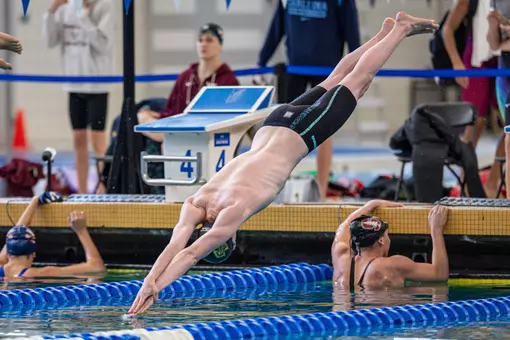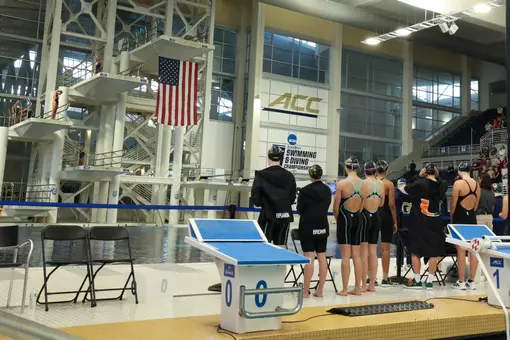Boston College Athletics
Tokyo-Bound With Barbadian Pride
July 20, 2021 | Swimming, #ForBoston Files
Volunteer assistant coach and BC graduate student Alex Sobers is heading to Tokyo this time as an Eagle and with BC head coach Mike Stephens.
The pageantry of the Olympic Games is often felt right at the start of the first night's opening ceremonies when the host country entertains a worldwide audience with a cultural artistic program. It sets a tone by highlighting the best and brightest achievements from all walks of its people while further establishing a theme for other countries to follow.
The Parade of Nations is arguably the best known and most popular portion of that theme. Every athlete marches into the stadium alongside their respective countries, and the costumes and flags offer glimpsing looks into every nation competing at the games. Smaller, lesser-known nations walk the same path as larger countries, and fans watching around the world all heighten their own personal anticipation for their cultural or native homeland.
Alex Sobers lived that walk during the 2016 Olympics when he marched into Rio de Janeiro with the Barbados national swim team. He was a national record holder for the Caribbean island and a Division II All-American at Emmanuel College, and he earned his way into Maracana Stadium by qualifying in the 400-meter freestyle.
 Five years later, Sobers is walking back into the Olympics for a second time. He is the literal and figurative flag bearer for the Barbadian swimmers, but this time he will hoist his nation's colors as a Boston College Eagle. A volunteer assistant coach in Chestnut Hill, he qualified after training with the team and its coaching staff, an honor that also earned BC's head coach, Mike Stephens, a trip to Tokyo as an assistant coach with the Barbados national program.
Five years later, Sobers is walking back into the Olympics for a second time. He is the literal and figurative flag bearer for the Barbadian swimmers, but this time he will hoist his nation's colors as a Boston College Eagle. A volunteer assistant coach in Chestnut Hill, he qualified after training with the team and its coaching staff, an honor that also earned BC's head coach, Mike Stephens, a trip to Tokyo as an assistant coach with the Barbados national program.
"This is really cool for Alex, obviously," Stephens said. "It's his second Olympics, but just for our program, it's really neat because he's been working as a volunteer coach for us. In that role, he's been able to train with the college swimmers all year long, and it's been really motivating for them. This is a really good thing, and I'm just really proud of our entire program."
Sobers' qualification is the final stamp on his Olympic qualifying cycle after he originally thought it was blown apart by the COVID-19 pandemic. He had finished his college career as a six-time All-American for the Georgia-based Lions and won both the 500-yard freestyle in 2019. A national record holder, he broke the four-minute barrier in Rio in 2016.
He expected that experience to lead directly into a second cycle for last year in Tokyo, but the arrival of the coronavirus postponed all activities for the Olympics for a full year. It threatened every athlete's training, but it led to a conversation between him and Stephens, the head coach who always looked for a new way to motivate his swimmers.
"He reached out to me, but he's a pretty humble guy," Stephens said, "so he didn't disclose all of the information about what he was trying to do. He explained that he wrapped up his college swimming career at Emmanuel College and explained how he had been an Olympian in 2016. Even though he finished college, he wanted to train after the postponement of the games so he could re-qualify for Tokyo. He had been recently accepted to grad school at BC, and he asked if he could be a part of our program, how it would operate and all of that."
Working with Stephens helped Sobers enjoy a successful training period, and he entered the ISCA International Senior Cup in March under the BC flag. It was with those colors that he defeated both Caeleb Dressel and Ryan Lochte en route to a first place finish in the 200-meter freestyle, and he added a second victory in the 400-meter later in the competition. He re-broke national records in both events and set a new Barbadian-best time in the 100-meter freestyle while adding a third place finish in the event.
"(Olympic) swimming is very different from the NCAA meets or from dual meets," Sobers said. "You can be walking out to the pool deck, and the people next to you are the best in the world. That alone is crazy to me, but then there are all of these people from your country and around the world watching you perform. That's pretty exciting, and I know I tried to live in that moment. So to have build and build to get back to compete and qualify was pretty special."
But merely qualifying for the Olympics wasn't enough for the BC program. Sobers will dive into the pool in Tokyo later this month, but he will do so alongside Stephens, his new coach who was named an assistant coach to the Barbadian national team. Now five years into his head coaching experience, he's a rising star in the sport's ranks after Sobers joined the three rostered swimmers to their respective national team time trials.
"I think Barbados saw value in having me come and help finish this process at the Games," Stephens said. "We have a really good relationship where it's not as much delegated as a coach as it is a partnership. I feel very privileged to help him achieve what he has so far, and I just did anything that I could do to help him get to that biggest stage. I want to be able to be there for him, and I feel fortunate that he advocated to help get me there so I can dive in with the Barbadian staff as well."
It adds layers to the Olympic swimming events even as the games shift into a surreality without fans. Japan previously prohibited foreign fans from attending the Games due to coronavirus travel concerns but announced in early July that the games would take place exclusively behind closed doors. It cast a shadow for the pandemic, but it did nothing to temper the expectations or excitement of the athletes committed to competing for national pride before an international audience.
"We talk about it a lot," Stephens said, "because he had such a successful college career. He could have just hung it up, but I think it says a lot about him as a person that he went through a very challenging time with COVID and wanted to keep pursuing those goals. The sport is a grind, and it's hard, especially when you're months away from hitting goals. He has a motto when we work out to not let temporary pain be the reason why someone can't achieve something really special down the line."
"It's been a long five years," Sobers said. "There's all of the challenges, and practicing every day, swimmers come in and play through their pain to go through those challenges. They sacrifice and overcome heartbreak. But you can't make long term decisions based on temporary feelings."
"I am somebody who obviously cares a lot about Boston College swimming," Stephens added, "but getting our first three women in program history to qualify for national trials and being able to work with Alex shows the progress that our team has made in a really short amount of time. We have some challenges, but to do some of these things at the highest level of the sport makes me really proud. I'm really proud of our program and how it helps these people achieve these goals that are really lofty."
The Parade of Nations is arguably the best known and most popular portion of that theme. Every athlete marches into the stadium alongside their respective countries, and the costumes and flags offer glimpsing looks into every nation competing at the games. Smaller, lesser-known nations walk the same path as larger countries, and fans watching around the world all heighten their own personal anticipation for their cultural or native homeland.
Alex Sobers lived that walk during the 2016 Olympics when he marched into Rio de Janeiro with the Barbados national swim team. He was a national record holder for the Caribbean island and a Division II All-American at Emmanuel College, and he earned his way into Maracana Stadium by qualifying in the 400-meter freestyle.

"This is really cool for Alex, obviously," Stephens said. "It's his second Olympics, but just for our program, it's really neat because he's been working as a volunteer coach for us. In that role, he's been able to train with the college swimmers all year long, and it's been really motivating for them. This is a really good thing, and I'm just really proud of our entire program."
Sobers' qualification is the final stamp on his Olympic qualifying cycle after he originally thought it was blown apart by the COVID-19 pandemic. He had finished his college career as a six-time All-American for the Georgia-based Lions and won both the 500-yard freestyle in 2019. A national record holder, he broke the four-minute barrier in Rio in 2016.
He expected that experience to lead directly into a second cycle for last year in Tokyo, but the arrival of the coronavirus postponed all activities for the Olympics for a full year. It threatened every athlete's training, but it led to a conversation between him and Stephens, the head coach who always looked for a new way to motivate his swimmers.
"He reached out to me, but he's a pretty humble guy," Stephens said, "so he didn't disclose all of the information about what he was trying to do. He explained that he wrapped up his college swimming career at Emmanuel College and explained how he had been an Olympian in 2016. Even though he finished college, he wanted to train after the postponement of the games so he could re-qualify for Tokyo. He had been recently accepted to grad school at BC, and he asked if he could be a part of our program, how it would operate and all of that."
Working with Stephens helped Sobers enjoy a successful training period, and he entered the ISCA International Senior Cup in March under the BC flag. It was with those colors that he defeated both Caeleb Dressel and Ryan Lochte en route to a first place finish in the 200-meter freestyle, and he added a second victory in the 400-meter later in the competition. He re-broke national records in both events and set a new Barbadian-best time in the 100-meter freestyle while adding a third place finish in the event.
"(Olympic) swimming is very different from the NCAA meets or from dual meets," Sobers said. "You can be walking out to the pool deck, and the people next to you are the best in the world. That alone is crazy to me, but then there are all of these people from your country and around the world watching you perform. That's pretty exciting, and I know I tried to live in that moment. So to have build and build to get back to compete and qualify was pretty special."
But merely qualifying for the Olympics wasn't enough for the BC program. Sobers will dive into the pool in Tokyo later this month, but he will do so alongside Stephens, his new coach who was named an assistant coach to the Barbadian national team. Now five years into his head coaching experience, he's a rising star in the sport's ranks after Sobers joined the three rostered swimmers to their respective national team time trials.
"I think Barbados saw value in having me come and help finish this process at the Games," Stephens said. "We have a really good relationship where it's not as much delegated as a coach as it is a partnership. I feel very privileged to help him achieve what he has so far, and I just did anything that I could do to help him get to that biggest stage. I want to be able to be there for him, and I feel fortunate that he advocated to help get me there so I can dive in with the Barbadian staff as well."
It adds layers to the Olympic swimming events even as the games shift into a surreality without fans. Japan previously prohibited foreign fans from attending the Games due to coronavirus travel concerns but announced in early July that the games would take place exclusively behind closed doors. It cast a shadow for the pandemic, but it did nothing to temper the expectations or excitement of the athletes committed to competing for national pride before an international audience.
"We talk about it a lot," Stephens said, "because he had such a successful college career. He could have just hung it up, but I think it says a lot about him as a person that he went through a very challenging time with COVID and wanted to keep pursuing those goals. The sport is a grind, and it's hard, especially when you're months away from hitting goals. He has a motto when we work out to not let temporary pain be the reason why someone can't achieve something really special down the line."
"It's been a long five years," Sobers said. "There's all of the challenges, and practicing every day, swimmers come in and play through their pain to go through those challenges. They sacrifice and overcome heartbreak. But you can't make long term decisions based on temporary feelings."
"I am somebody who obviously cares a lot about Boston College swimming," Stephens added, "but getting our first three women in program history to qualify for national trials and being able to work with Alex shows the progress that our team has made in a really short amount of time. We have some challenges, but to do some of these things at the highest level of the sport makes me really proud. I'm really proud of our program and how it helps these people achieve these goals that are really lofty."
Men's Basketball Recap: 68-67 Win vs Wake Forest
Thursday, February 26
Men's Basketball: Wake Forest Postgame Press Conference (Feb. 25, 2026)
Thursday, February 26
The Podcast for Boston Women's Tennis Edition
Tuesday, February 24
The Vision: 2026 Winter Workouts with Boston College Football
Tuesday, February 24


















